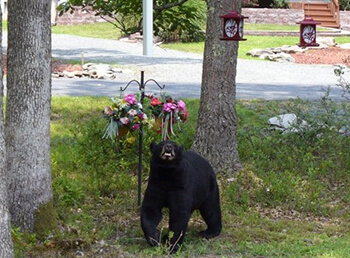
Bears enjoy hanging flower baskets and birdseed from feeders.
A bear on the back porch, a bear in the trash, or a bear destroying a bird feeder are all relatively minor situations and almost all could be avoided by Becoming BearWise, according to the Georgia Department of Natural Resources’ Wildlife Resources Division.
“Avoiding problems with bears is usually simple, though it may not always be convenient,” says Adam Hammond, WRD’s state bear biologist. “One of the six BearWise Basics is about securing food, garbage, and recycling. When bears have access to human-provided foods, regardless of the source or the intent, they will take advantage of them, and that often leads to further problems.”
Why is it such a big deal?
A bear that repeatedly finds food from garbage cans, bird feeders, and pet food bowls is unlikely to leave and will become bolder in its search for easy food. This leads to potential property damage to homes, garages, vehicles, and more. Once bears have learned bad habits and have come to rely on people for a “free meal,” they never change those behaviors, and this type of behavior progressively gets worse with time and experience. If you really care about bears, please make the extra effort to ensure that your home and yard are “unattractive” to bears – to protect yourself, your family and pets, and bears.
BearWise is an education program developed by bear biologists from each of the 15 state wildlife agencies that make up the Southeastern Association of Fish and Wildlife Agencies (SEAFWA). The program, anchored by the website www.bearwise.org, offers citizen-specific, detailed, and high-quality information to help people live responsibly with bears and to keep bears wild.
The black bear is a symbol of Georgia’s natural diversity, the only bear found in the state and a conservation success story. Though now considered the most common bear in North America, the species was nearly eradicated from Georgia in the 1930s due to unregulated hunting, illegal harvest – including the killing of bears as “vermin,” and large-scale habitat loss. Sound wildlife management practices have restored Georgia’s black bears to a thriving population estimated at 4,100 bears statewide.
Black bears may legally be taken during the hunting season, which occurs each fall in Georgia (www.georgiawildlife.com/hunting/hunter-resources). However, the taking of bears during any other time of the year, or the taking of bears illegally during the hunting season is called poaching. Prevent poaching of bears (by email, phone or in person) by reporting any illegal activity. Visit http://gadnrle.org/ranger-hotline for more information.
For more information on living responsibly with bears, visit www.bearwise.org.
Photo: Courtesy of DNR




